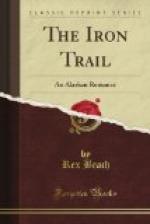O’Neil smiled. “That’s hardly necessary now, is it? I own every inch of water-front at that point, and there’s no other harbor. My track will be laid to the glaciers by the time snow flies.”
“Trevor reports that a bridge is possible, although expensive.”
“It will cost two million dollars.”
“I don’t see how it can be built to withstand the ice.”
“I’ll guarantee to build it so it will hold.”
“What is your proposition?” asked Heidlemann.
“I’ll sell the S.R.&N. for five million dollars and contract to complete the road within two years on a ten-per-cent commission.”
“It has cost you about three million dollars, I believe. That would leave you a handsome profit.”
“One million for me, one million for my associates.”
“What will the remaining hundred miles cost?”
“About ten millions. That will give me another million profit as contractor. My force and equipment is on the ground. I can save you money and a year’s time.”
Mr. Heidlemann drummed upon the top of his desk for a moment.
“You’re a high-priced man, O’Neil,” he said, finally.
“You’ve had experience with the other kind.”
“Counting the money we’ve already sunk, the road would stand us about twenty million dollars completed.”
“It will cost thirty to build from Cortez, and take two years longer.”
Mr. Heidlemann seemed to consider this for a moment. “We’ve had this matter before us almost constantly since the report of the storm,” he said, at length, “and after deliberation our directors have voted to do nothing just yet.”
O’Neil opened his eyes in amazement.
“I don’t understand.”
“It’s this way. Our engineers first recommended Cortez as a starting-point, and we spent a fortune there. Then you attacked the other route, and we sent Trevor up to find if you were right and we were wrong. He recommended the Salmon River valley, and told us he could build a breakwater at Kyak. You know the result. We relied upon him, for he seemed to be the best man in the country, but as a matter of precaution we later sent other engineers. Their reports came in not three months ago, and, while all seemed confident that the breakwater could be built, none of them were certain about the bridge. One, in fact, condemned it absolutely. Now on the heels of their statements comes the news that the very work they united in declaring feasible has been undone. Naturally, we don’t know where we are or whom to believe.”
“They simply didn’t know the conditions at Kyak,” argued O’Neil, “and they evidently haven’t studied the bridge as I have. But you’ll have to go at the breakwater again or build in from Cortez or give up.”
“No, we have decided to mark time until that crossing is proved feasible. Understand, I voice the sentiment of the majority.”
“If I build that bridge you may find it more difficult to buy me out,” said O’Neil, quietly.




